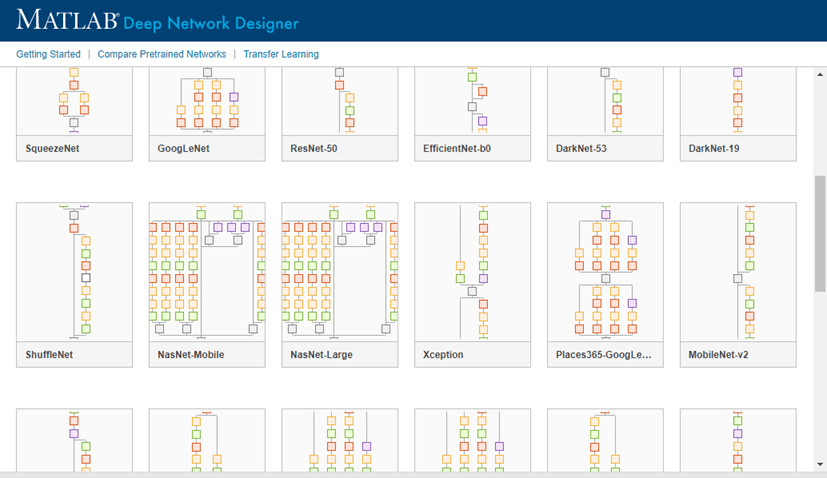vgg19 - (Not recommended) VGG-19 convolutional neural network - MATLAB (original) (raw)
(Not recommended) VGG-19 convolutional neural network
Syntax
Description
VGG-19 is a convolutional neural network that is 19 layers deep. You can load a pretrained version of the network trained on more than a million images from the ImageNet database [1]. The pretrained network can classify images into 1000 object categories, such as keyboard, mouse, pencil, and many animals. As a result, the network has learned rich feature representations for a wide range of images. The network has an image input size of 224-by-224. For more pretrained networks in MATLAB®, see Pretrained Deep Neural Networks.
[net](#bvmdok9-net) = vgg19 returns a VGG-19 network trained on the ImageNet data set.
This function requires Deep Learning Toolbox™ Model for VGG-19 Network support package. If this support package is not installed, then the function provides a download link.
[net](#bvmdok9-net) = vgg19('Weights',`'imagenet'`) returns a VGG-19 network trained on the ImageNet data set. This syntax is equivalent tonet = vgg19.
[layers](#mw%5Fa7a9a1cd-913a-43b4-a9e4-0ade03d5e9b8) = vgg19('Weights',`'none'`) returns the untrained VGG-19 network architecture. The untrained model does not require the support package.
Examples
This example shows how to download and install Deep Learning Toolbox Model for VGG-19 Network support package.
Type vgg19 at the command line.
If Deep Learning Toolbox Model for VGG-19 Network support package is not installed, then the function provides a link to the required support package in the Add-On Explorer. To install the support package, click the link, and then clickInstall. Check that the installation is successful by typingvgg19 at the command line.
ans =
SeriesNetwork with properties:
Layers: [47×1 nnet.cnn.layer.Layer]Visualize the network using Deep Network Designer.
deepNetworkDesigner(vgg19)
Explore other pretrained neural networks in Deep Network Designer by clicking New.

If you need to download a neural network, pause on the desired neural network and click Install to open the Add-On Explorer.
Output Arguments
Pretrained VGG-19 convolutional neural network returned as a SeriesNetwork object.
Untrained VGG-19 convolutional neural network architecture, returned as a Layer array.
References
[1] ImageNet. http://www.image-net.org.
[2] Russakovsky, O., Deng, J., Su, H., et al. “ImageNet Large Scale Visual Recognition Challenge.” International Journal of Computer Vision (IJCV). Vol 115, Issue 3, 2015, pp. 211–252
[3] Simonyan, Karen, and Andrew Zisserman. “Very Deep Convolutional Networks for Large-Scale Image Recognition.” Preprint, submitted in 2014. https://doi.org/10.48550/ARXIV.1409.1556.
[4] Very Deep Convolutional Networks for Large-Scale Visual Recognition http://www.robots.ox.ac.uk/\~vgg/research/very\_deep/
Extended Capabilities
For code generation, you can load the network by using the syntax net = vgg19 or by passing the vgg19 function to coder.loadDeepLearningNetwork (MATLAB Coder). For example: net = coder.loadDeepLearningNetwork('vgg19')
For more information, see Load Pretrained Networks for Code Generation (MATLAB Coder).
The syntax vgg19('Weights','none') is not supported for code generation.
Usage notes and limitations:
- For code generation, you can load the network by using the syntax
net = vgg19or by passing thevgg19function to coder.loadDeepLearningNetwork (GPU Coder). For example:net = coder.loadDeepLearningNetwork('vgg19')
For more information, see Load Pretrained Networks for Code Generation (GPU Coder). - The syntax
vgg19('Weights','none')is not supported for GPU code generation.
Version History
Introduced in R2017a
vgg19 is not recommended. Use the imagePretrainedNetwork function instead and specify"vgg19" as the model.
There are no plans to remove support for the vgg19 function. However, the imagePretrainedNetwork function has additional functionality that helps with transfer learning workflows. For example, you can specify the number of classes in your data using thenumClasses option, and the function returns a network that is ready for retraining without the need for modification.
The imagePretrainedNetwork function returns the network as a dlnetwork object, which does not store the class names, To get the class names of the pretrained network, use the second output argument of the imagePretrainedNetwork function.
This table shows some typical usages of the vgg19 function and how to update your code to use theimagePretrainedNetwork function instead.
| Not Recommended | Recommended |
|---|---|
| net = vgg19; | [net,classNames] = imagePretrainedNetwork("vgg19"); |
| net = vgg19(Weights="none"); | net = imagePretrainedNetwork("vgg19",Weights="none"); |
The imagePretrainedNetwork returns a dlnetwork object, which also has these advantages:
dlnetworkobjects are a unified data type that supports network building, prediction, built-in training, visualization, compression, verification, and custom training loops.dlnetworkobjects support a wider range of network architectures that you can create or import from external platforms.- The trainnet function supports
dlnetworkobjects, which enables you to easily specify loss functions. You can select from built-in loss functions or specify a custom loss function. - Training and prediction with
dlnetworkobjects is typically faster thanLayerGraphandtrainNetworkworkflows.
To train a neural network specified as a dlnetwork object, use the trainnet function.
